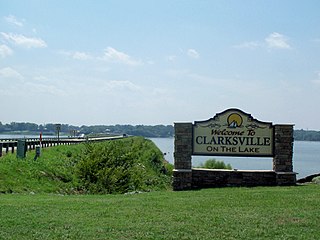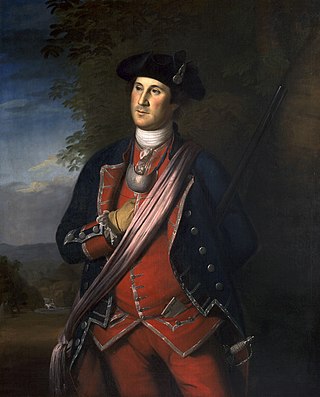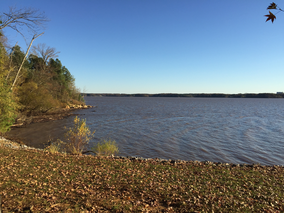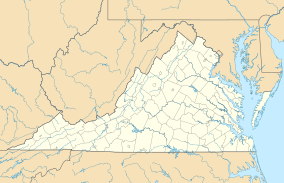
Clarksville is a town in Mecklenburg county in the U.S. state of Virginia, near the southern border of the commonwealth. The population was 1,139 at the 2010 census. Since the town has numerous buildings of the 18th-, 19th-, and early 20th-century architecture, the downtown area of Clarksville has been designated a Historic District on the National Register of Historic Places and Virginia's Historic Register. Clarksville claims the title of Virginia's only Lakeside town. Nearby the town of Clarksville is Occoneechee State Park.

Nathaniel Bacon was an English merchant adventurer who emigrated to the Virginia Colony, where he sat on the Governor's Council but later led Bacon's Rebellion. The Rebellion was briefly successful; but after Bacon’s death from dysentery the rebel forces collapsed.

Bacon's Rebellion was an armed rebellion held by Virginia settlers that took place from 1676 to 1677. It was led by Nathaniel Bacon against Colonial Governor William Berkeley, after Berkeley refused Bacon's request to drive Native American Indians out of Virginia. Thousands of Virginians from all classes and races rose up in arms against Berkeley, chasing him from Jamestown and ultimately torching the settlement. The rebellion was first suppressed by a few armed merchant ships from London whose captains sided with Berkeley and the loyalists. Government forces arrived soon after and spent several years defeating pockets of resistance and reforming the colonial government to be once more under direct Crown control.

The Province of Maryland was an English and later British colony in North America from 1634 until 1776, when the province was one of the Thirteen Colonies that joined in supporting the American Revolution against Great Britain. In 1781, Maryland was the 13th signatory to the Articles of Confederation. The province's first settlement and capital was in St. Mary's City, located at the southern end of St. Mary's County, a peninsula in the Chesapeake Bay bordered by four tidal rivers.

Occoneechee Mountain State Natural Area is a North Carolina state park in Orange County, North Carolina in the United States. Located adjacent to the town of Hillsborough, it covers 221 acres (0.89 km2) and includes Occoneechee Mountain, the highest point (867 ft) in Orange County and a settlement of the Occaneechi tribe.

The Virginia militia is an armed force composed of all citizens of the Commonwealth of Virginia capable of bearing arms. The Virginia militia was established in 1607 as part of the English militia system. Militia service in Virginia was compulsory for all free males. The main purpose of the Crown's militia was to repel invasions and insurrections and to enforce the laws of the colony.

Bacon's Castle, also variously known as "Allen's Brick House" or the "Arthur Allen House" is located in Surry County, Virginia, United States, and is the oldest documented brick dwelling in what is now the United States. Built in 1665, it is noted as an extremely rare example of Jacobean architecture in the New World.

John Washington was an English-born merchant, planter, politician and military officer. Born in Tring, Hertfordshire, he subsequently emigrated to the English colony of Virginia and became a member of the planter class. In addition to serving in the Virginia militia and owning several slave plantations, Washington also served for many years in the House of Burgesses, representing Westmoreland County. He was the first member of the Washington family to live in North America and was the paternal great-grandfather of George Washington, the first president of the United States.

Occoneechee Speedway was one of the first two NASCAR tracks to open. It closed in 1968 and is the only dirt track remaining from the inaugural 1949 season.

The Mattaponi tribe is one of only two Virginia Indian tribes in the Commonwealth of Virginia that owns reservation land, which it has held since the colonial era. The larger Mattaponi Indian Tribe lives in King William County on the reservation, which stretches along the borders of the Mattaponi River, near West Point, Virginia.

The John H. Kerr Reservoir is a reservoir along the border of the U.S. states of North Carolina and Virginia. The U.S. Army Corps of Engineers constructed the John H. Kerr Dam across the Roanoke River between 1947 and 1952 to produce hydroelectricity as well as for flood control. Kerr Lake is the largest lake in Virginia, with 850 miles (1,370 km) of shoreline located in Vance, Granville, and Warren counties in North Carolina, as well as Mecklenburg, Charlotte, and Halifax counties in Virginia. At its maximum capacity, it covers approximately 50,000 acres (200 km2) and is one of the largest reservoirs in the Southeastern United States. The name honors its Congressional sponsor, John H. Kerr, a North Carolina Democrat who supported creation of the lake. The lake supports recreational tourism in North Carolina and Virginia as described below.

The Occaneechi are Indigenous peoples of the Northeastern Woodlands whose historical territory was in the Piedmont region of present-day North Carolina and Virginia.
Colonel John West, Jr. of West Point, Virginia (1632–1691) was a planter, commander of the New Kent Militia in the Colony of Virginia and represented the county in the House of Burgesses, as would his sons. Complicating matters, while this man sided with Governor William Berkeley during Bacon's Rebellion and had his property at West Point severely damaged, his cousin of the same name who lived on Virginia's Eastern Shore sided with the rebels and briefly represented Accomack County as a burgess, and received a pardon after the conflict.

The Doeg were a Native American people who lived in Virginia. They spoke an Algonquian language and may have been a branch of the Nanticoke tribe, historically based on the Eastern Shore of Maryland. The Nanticoke considered the Algonquian Lenape as "grandfathers". The Doeg are known for a raid in July 1675 that contributed to colonists' uprising in Bacon's Rebellion.
The Occoneechee Council (421) of the Boy Scouts of America serves some 8,200 youths and 4,600 adults in central North Carolina, US. The Occoneechee Council is the largest Boy Scout council in North Carolina and serves Chatham, Cumberland, Durham, Franklin, Granville, Harnett, Lee, Moore, Orange, Vance, Wake and Warren counties. These twelve counties are divided into four districts. Besides providing administrative support for Scout troops in their council area, they also maintain three large campgrounds.
George Mason I was the American progenitor of the prominent American landholding and political Mason family. Mason was the great-grandfather of George Mason IV, a Founding Father of the United States.

Jamestown, also Jamestowne, was the first settlement of the Virginia Colony, founded in 1607, and served as the capital of Virginia until 1699, when the seat of government was moved to Williamsburg. This article covers the history of the fort and town at Jamestown proper, as well as colony-wide trends resulting from and affecting the town during the time period in which it was the colonial capital of Virginia.

The Battle of Bloody Run was fought in March or April 1656 near Richmond, Virginia.
James Crewes was a British merchant who traded with the Virginia colony before emigrating there. He became a planter in Henrico County and represented it for one session of the House of Burgesses, but was executed for his participation in Bacon's Rebellion.
Thomas Mathew was an English merchant who became a planter and politician in the Colony of Virginia. He owned property in Northumberland County and was one of the first burgesses representing Stafford County in the House of Burgesses when it was formed. An Indian raid which killed one of his herdsmen was a precursor of Bacon's Rebellion and shortly before his death in London Mathew wrote an account of that conflict which was published a century later.















